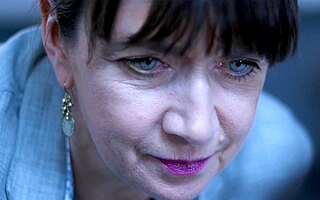
BBC Scotland is a division of the BBC and the main public broadcaster in Scotland.

Sir William Tyrone Guthrie was an English theatrical director instrumental in the founding of the Stratford Festival of Canada, the Guthrie Theater in Minneapolis, Minnesota, and the Tyrone Guthrie Centre at his family's ancestral home, Annaghmakerrig, near Newbliss in County Monaghan, Ireland. He is famous for his original approach to Shakespearean and modern drama.
The Scottish Renaissance was a mainly literary movement of the early to mid-20th century that can be seen as the Scottish version of modernism. It is sometimes referred to as the Scottish literary renaissance, although its influence went beyond literature into music, visual arts, and politics. The writers and artists of the Scottish Renaissance displayed a profound interest in both modern philosophy and technology, as well as incorporating folk influences, and a strong concern for the fate of Scotland's declining languages.
Rona Munro is a Scottish writer. She has written plays for theatre, radio, and television. Her film work includes Ken Loach's Ladybird, Ladybird (1994), Oranges and Sunshine (2010) for Jim Loach and Aimée & Jaguar (1999), co-authored by German director Max Färberböck. Munro is the second cousin of Scottish author Angus MacVicar.

The Citizens Theatre, in what was the Royal Princess's Theatre, is the creation of James Bridie and is based in Glasgow, Scotland, as a principal producing theatre. The theatre includes a 500-seat Main Auditorium, and has also included various studio theatres over time.

James Bridie was the pseudonym of a Scottish playwright, screenwriter and physician whose real name was Osborne Henry Mavor. He took his pen-name from his paternal grandfather's first name and his grandmother's maiden name.
Andrew William Agnew is a Scottish actor, singer and director. He is best known for playing the role of PC Plum in the BAFTA award-winning CBeebies programme Balamory, Tam in CBeebies Woolly & Tig and Walter in Scots Squad.
Blythe Duff is a Scottish actress best known for her role as Jackie Reid in the ITV television series drama, Taggart.
Robert McLellan OBE (1907–1985) was a Scottish Renaissance dramatist, writer and poet and a leading figure in the twentieth century movement to recover Scotland’s distinctive theatrical traditions. He found popular success with plays and stories written in his native Scots tongue and is regarded, alongside William Lorimer, as one of the most important modern exponents of fine prose in the language.

Theatre of United Kingdom plays an important part in British culture, and the countries that constitute the UK have had a vibrant tradition of theatre since the Renaissance with roots going back to the Roman occupation.

Maureen Jane Beattie is an Irish-born, Scottish actress of both stage and screen.

Theatre in Scotland refers to the history of the performing arts in Scotland, or those written, acted and produced by Scots. Scottish theatre generally falls into the Western theatre tradition, although many performances and plays have investigated other cultural areas. The main influences are from North America, England, Ireland and from Continental Europe. Scotland's theatrical arts were generally linked to the broader traditions of Scottish and English-language literature and to British and Irish theatre, American literature and theatrical artists. As a result of mass migration, both to and from Scotland, in the modern period, Scottish literature has been introduced to a global audience, and has also created an increasingly multicultural Scottish theatre.

Freya Mavor is a Scottish actress. She is best known for her roles as Mini McGuinness in the E4 teen drama Skins and Daria Greenock in the HBO finance drama series Industry.

The Scottish Community Drama Association (SCDA) is an association of amateur dramatic clubs throughout Scotland. It was first founded in 1926. Amateur theatre companies in Scotland have generally presented repertoire in English, Lowland Scots and, more occasionally, Scottish Gaelic.

Jack Andrew Lowden is a Scottish actor. Following a four-year stage career, his first major international onscreen success was in the 2016 BBC miniseries War & Peace, which led to starring roles in feature films. He has received several awards including two BAFTA Scotland Awards and a Laurence Olivier Award.
Robert Trotter was a Scottish actor, director, and photographer.
Glasgow Repertory Theatre was a short-lived Scottish professional theatre founded in Glasgow in 1909 by Alfred Wareing. Its aim, directly inspired by the example of Dublin's Abbey Theatre, was to break Scotland's theatrical dependence on London. Over the previous thirty years, Scottish theatrical activity had been increasingly dominated by touring London companies using transport by rail to bring their productions north, a situation that had effectively contributed to the demise of the country's own stock theatre companies, which had had growing success in the mid-nineteenth century.

Richard Rankin is a Scottish film, television and theatre actor. He is best known for the Scottish sketch show Burnistoun and as Roger Wakefield MacKenzie in the Starz drama Outlander.
The 1947 Edinburgh Festival Fringe was the first edition of what would become the world's largest arts festival, the Edinburgh Festival Fringe.
The Gateway Theatre was a Category C listed building in Edinburgh, Scotland, situated on Elm Row at the top of Leith Walk.









